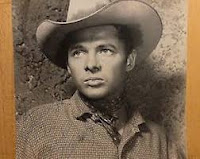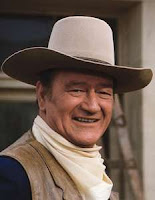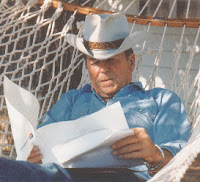I support the left, though I’m leaning, leaning to the right.
-Cream “Politician” 1968
Movie stars, writers, directors and producers on all ends of the political spectrum have made western films and occasionally their agendas have creeeped into the finished product. Usually, however, it is autonomous and not indicative of a greater movement or trend.
Certainly, the lone homesteader on the frontier protecting his land and family with his home security system, a long-range rifle, an arm’s-length away taps into a vaguely ‘red state’ appeal. But perhaps that is merely art imitating life.
The 1950’s may have encapsulated the political divide more than other eras with its slowly shifting values and attitudes at the fore of the western’s commercial pinnacle. Communist Party sympathizers were not limited to clandestine gatherings, as Audie Murphy discovered when he arrived there to begin a career in movies, many of which would be westerns.
Having returned from service in World War II as one of the war’s most decorated soldiers and a recipient of the Medal of Honor, he was particularly turned off by the town’s left-wing associations. In turn, his disdain for their loyalties didn’t endear the war hero to the Tinseltown elite and he remained a loner throughout his years there.
Later, Murphy became involved in the trial of Jimmy Hoffa, working tirelessly to have the Teamsters boss released from federal prison. Ominously, within years, both men were gone. In 1971, Murphy was killed in a private plane crash while seeking investors for a new production. He was buried at Arlington National Cemetery with full military honors and no Hollywood acquaintances in attendance.
No one was more concerned with the threat of communism than John Wayne. A supporter of Senator Joseph McCarthy and the House Un-American Activities Committee and founding member of the Motion Picture Alliance for the Preservation of American Ideals, Wayne was allegedly deemed formidable enough to be targeted by assassins on no more than three occasions. In the first such incident, two KGB agents sent to apprehend the Duke on a movie set were intercepted by some FBI agents with the assistance of Wayne’s friend and arguably the world’s greatest stuntman, Yakima Canutt and his team of Hollywood stuntmen.
The nefarious order had incidentally been given by Stalin himself, unbelievably, a die-hard fan of American westerns and John Wayne pictures(!) Two subsequent attempts on Wayne’s life occurred in Chihuahua, Mexico on the set of Hondo and while Wayne was visiting troops in Vietnam when snipers tried taking out the Duke under orders from Mao Tse Tung. Wayne claimed to have kept the incidents from the press for his family’s protection but it only served to reaffirm his anti-communist stance.
High Noon, directed by blacklisted Fred Zinnemann, has long been considered a parable of the communist hunts. As its main character, Will Kane, seeks cooperation from his community in the face of danger, the citizens cower on the principle that the fight is not theirs. John Wayne, however, would take this more literally. It was the final scene in High Noon, when Wayne’s friend and fellow conservative, Gary Cooper shed his tin star and kicked it into the dirt that infuriated Wayne and director Howard Hawks to respond with nothing less than their own filmic retort. Rio Bravo’s story-line was more of a response to High Noon’s “un-American” story-line with a town marshal pathetically pleading citizens to back him up than a reaction to any veiled commentary on McCarthyism.
Wayne’s high profile found enough favor with some political insiders that he was reportedly asked to run for office. His reason for declining? No one would ever vote for an actor. Somehow, the notion wasn’t so outrageous that he couldn’t endorse another actor. Poignantly, the Los Angeles hospital where the Duke took his last breath in 1979 bears the name Ronald Reagan UCLA Medical Center.
In closing, there is east and west; there are villains and heroes. But the heroes are not exclusively on the left or the right. Rather they are at the top, specifically above the movie title on the marquee outside the theatre. Political? Perhaps. But it’s really all about show business. Isn’t it?
Thanks for reading WMD!
Christopher Robinson
















No comments:
Post a Comment
Thank you for your comment.